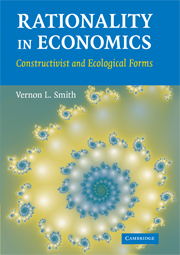You’re rational after all: unconscious development insights from unreadable books

Vernon Smith is a Nobel Prize winner. You quickly realize on reading this book that he got it for economics, not literature. But if you can slog through this book (which took me about 4 months), you will be rewarded with some great insights about development. (But why I am working so hard when Tyler Cowen’s blog is about topless French sun-bathers?)
His big picture is familiar to readers of Hayek: societies develop NOT through the conscious design of some experts (Smith uses the horrible jargon “constructivist” for the design view), but through the “ecological” survival of institutions, norms, rules, firms, and products in a society of freely choosing individuals.
It gets more novel when Smith applies a similar insight to individual rationality. Unlike most of his experimentalist colleagues, Smith is not celebrating findings of human irrationality in the lab as the greatest thing to come along since Sacha Baron Cohen. Instead, Smith wants to look more deeply at “irrationality” and see if in some cases it might be rational after all. The big idea is similar to the above: as humans biologically and culturally evolved, unconscious ways of acting “rationally” passed “ecological” tests of contributing to survival and well-being. The standard “rationality” model that looks at only explicit constraints and logical reasoning (“constructivist”) is way too simplistic for Smith.
An example is the well-known two-player game, the prisoner’s dilemma, when each player gets a higher payoff by cheating if the other doesn’t. The payoff is still very high if neither cheat, and it is the lowest if both cheat. Rational behavior predicts that both players cheat and hence wind up with the lowest payoff. Yet laboratory experiments with real human subjects and real money find that both refrain from cheating surprisingly often.
So players are behaving “irrationally,” yet Smith points out that they have managed to get a better outcome than what “rational” behavior would achieve. He argues that players have unconscious social norms of “fair” behavior (and also they may find ways of “socially” signaling to each other these norms, since one thing we know about humans is that their social skills are highly advanced). Unconscious sociability allows humans to realize gains from social exchange that cannot be captured by the explicit “rational decision” model. He finds more evidence for this idea by subtle variations in the social context of the experiment.
Smith doesn’t address development differences, so the big question is why gains from social exchange are realized more in some societies than others. Maybe he will get to that in his next unreadable insightful book.
 From Aid to Equality
From Aid to Equality
